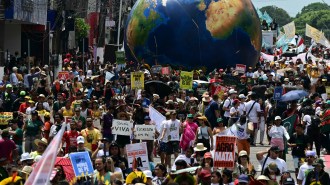Obama: Climate’s rock star
COPENHAGEN A little over a half-hour ago, President Barack Obama wrapped up a stirring pep talk to his fellow world leaders attending the United Nations climate change meeting. He didn’t promise the world. Only that the United States could be depended upon to do its part in helping stem global greenhouse gas emissions and to fund measures that would help fund the world’s poorest and climate-beleaguered nations adapt to the environmental changes they are experiencing.
But what was especially interesting was to watch how the whole climate conference has waited with baited breath for the past day to learn what Obama would say. Every foreign reporter mentioned Obama with a sense of reverence. Each invariably asked the closest American what to expect: Could our President make promises that would at last galvanize action in the United States and accord among countries whose views, even yesterday, seemed poles apart?
We in the States know how limited a President’s control of issues is. He can propose new programs and strategies. But he can’t enact many of them without the cooperation of Congress. It’s part of our system of checks and balances on government action.
Outside the United States, however, he’s viewed as a man who can do the impossible. I heard one young and very well educated Chinese journalist, the other day, say: “Obama. He’s a god.” I corrected her and said he’s just an erudite politician and charismatic speaker. “No,” she assured me. “I know he has limits. But to me, he’s still a god.”
Today, the newsroom I’ve been working in all week was abuzz by 7:30 a.m. and filled to capacity by 9:30 (owing in part to the fact that the United Nations issued press badges to roughly three times the number of seats available in the news-media center.) Everyone was running on adrenaline. Would an accord be reached later today? Would divergent views deadlock the consensus process?
Those are the important issues we all came to learn. And the cerebral ones.
But on a personal level, the reporters, the foreign delegations and the United Nations staff were also pumping gallons of adrenaline over the prospect of hearing from Obama. More than any other leader, they have been looking to him to forge alliances between competing camps and win a climate accord.
It a herculean task, owing to the gulfs that will need to be bridged during the next 12 or so hours. But if anyone can do it, the collective crowds seem to say, it will be Obama. They not only hope so, they pray so.
As an American, it’s a bit weird to see such veneration of the man. Of any man. He is not a god. He is not capable of moving real mountains. But it certainly gave me pride to see the face of world opinion changing. To see America again being viewed as a nation that can do anything it sets its mind to (even if it can’t).
So what did Obama say this afternoon (beginning around 12:40 p.m. local time)?
— I believe that we can act boldly, and decisively, in the face of this common threat. And that is why I have come here today. As the world’s largest economy and the world’s second largest emitter, America bears our share of responsibility in addressing climate change, and we intend to meet that responsibility…
— We are convinced that changing the way that we produce and use energy is essential to America’s economic future – that it will create millions of new jobs, power new industry, keep us competitive, and spark new innovation…That is why it is in our mutual interest to achieve a global accord in which we agree to take certain steps, and hold each other accountable for our commitments.
— all major economies must put forward decisive national actions that will reduce their emissions, and begin to turn the corner on climate change. I’m pleased that many of us have already done so, and I’m confident that America will fulfill the commitments that we have made: cutting our emissions in the range of 17 percent by 2020, and by more than 80 percent by 2050 in line with final legislation.
— we must have a mechanism to review whether we are keeping our commitments, and to exchange this information in a transparent manner. These measures need not be intrusive, or infringe upon sovereignty. They must, however, ensure that an accord is credible, and that we are living up to our obligations. For without such accountability, any agreement would be empty words on a page.
— This is not a perfect agreement, and no country would get everything that it wants. There are those developing countries that want aid with no strings attached, and who think that the most advanced nations should pay a higher price. And there are those advanced nations who think that developing countries cannot absorb this assistance, or that the world’s fastest-growing emitters should bear a greater share of the burden…We know the fault lines because we’ve been imprisoned by them for years.
— But here is the bottom line: We can embrace this accord, take a substantial step forward, and continue to refine it and build upon its foundation…Or we can again choose delay, falling back into the same divisions that have stood in the way of action for years. And we will be back having the same stale arguments month after month, year after year – all while the danger of climate change grows until it is irreversible.
— America has made our choice. We have charted our course. We have made our commitments. And we will do what we say.
As he spoke, Obama held audiences in thrall throughout the convention center – heads of states in the plenary session, delegations at huge TV monitors throughout the halls, and reporters listening on UN-supplied headsets. But were his stirring words and delivery enough to salvage the talks?
In a few hours we’ll know.







